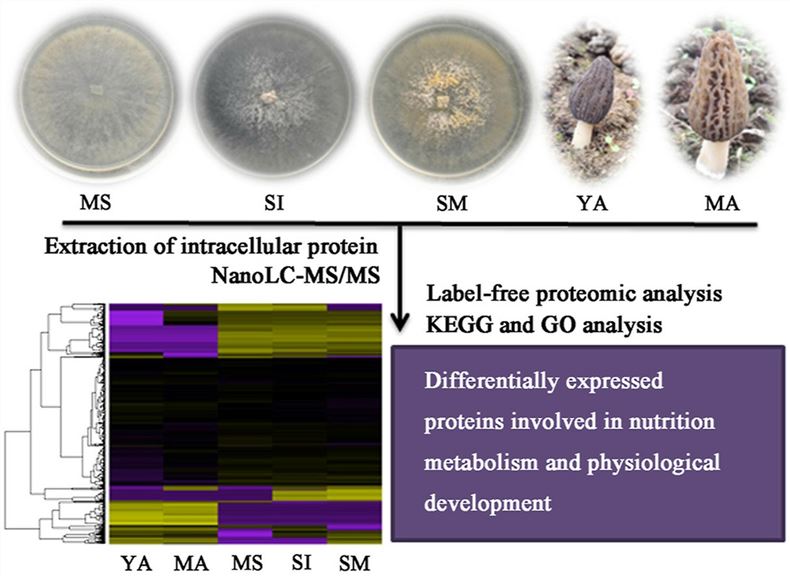Based on cutting-edge proteomics technology platforms, Lifeasible provides mushroom different proteomics services in different developmental stages to analyze protein expression changes in different developmental stages of mushroom fruiting body, providing information for further study of mushroom growth and development mechanisms.
Introduction to Mushroom Proteomics in Different Developmental Stages
Mushrooms have great application value and development potential in functional food and medicine. In addition to the influence of external factors such as cultivation conditions, the genetic characteristics of mushroom strains themselves are crucial to their yield. Mushroom development can be divided into six stages: mycelium growth until it occupies half of the bag, mycelium occupying the whole bag under low-temperature stimulation, the emergence of mycelium from the protoplast, protoplast, mycelium at harvest stage and mature fruiting body. These growth and development processes involve several processes, such as metabolism, synthesis and transport of substances, signal transduction, and pigment secretion. Researchers usually analyze the developmental mechanisms of mushrooms at the protein level, starting with the changes in the proteome at different developmental stages.
 Fig. 1. Label-free based comparative proteomic analysis of Morchella importuna development from the vegetative to the sexual reproductive stages. (Cai Y, et al., 2022)
Fig. 1. Label-free based comparative proteomic analysis of Morchella importuna development from the vegetative to the sexual reproductive stages. (Cai Y, et al., 2022)
Services
To analyze nutritional metabolism and fruiting body development throughout the development of mushrooms at the protein level, Lifeasible provides mushroom differential proteomics in different developmental stages of the mushroom fruiting body to screen and analyze key genes and their expression changes. Our proteomic data support the mechanistic investigation of mushroom fruiting body growth, development, and maturation. In addition, we try to improve mushroom yield or quality and extend mushroom shelf life by regulating the expression of relevant loci or proteins.
We focus on the differential proteomics of mushrooms at four developmental stages, including mycelium, protoplast, fruiting body, and mature fruiting body stages. The cutting-edge iTRAQ-MS/MS technology platform provides insight into the systematic responses of mushrooms to environmental stresses and protein-protein interactions at different developmental stages. We offer customized processes for analyzing mushroom differential proteomics in different developmental stages.
- Samples of the mushroom fruiting body in different developmental stages.
- Protein extraction and quantification.
- iTRAQ-MS/MS analysis.
- Proteome bioinformatics analysis.
- Fluorescence quantitative PCR (qPCR) validation of differential proteins.
Our identification of proteins with potential roles in mushroom development can provide useful information on fruiting body formation, possibly one of the most important developmental events in the life cycle of this mushroom. Lifeasible is currently working to obtain more information about the proteome of mushrooms at each developmental stage by utilizing various proteomic tools such as liquid chromatography-based separations and label-free quantitative proteomics. If you are interested in our services, please contact us.
Reference
- Cai Y, Liu W, Zhang Q, et al. (2022) Label-free based comparative proteomic analysis of Morchella importuna development from the vegetative to the sexual reproductive stages[J]. Journal of Agriculture and Food Research. 7: 100247.
For research or industrial raw materials, not for personal medical use!


 Fig. 1. Label-free based comparative proteomic analysis of Morchella importuna development from the vegetative to the sexual reproductive stages. (Cai Y, et al., 2022)
Fig. 1. Label-free based comparative proteomic analysis of Morchella importuna development from the vegetative to the sexual reproductive stages. (Cai Y, et al., 2022)